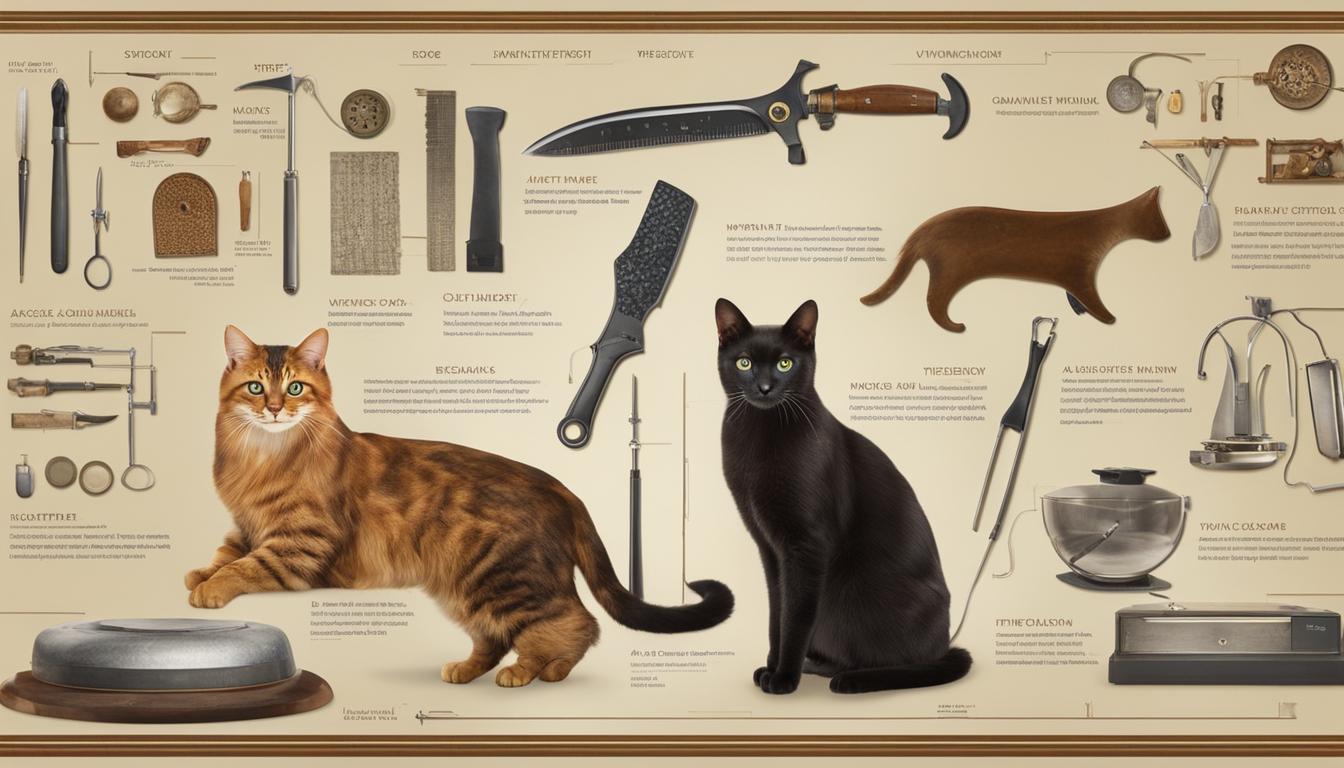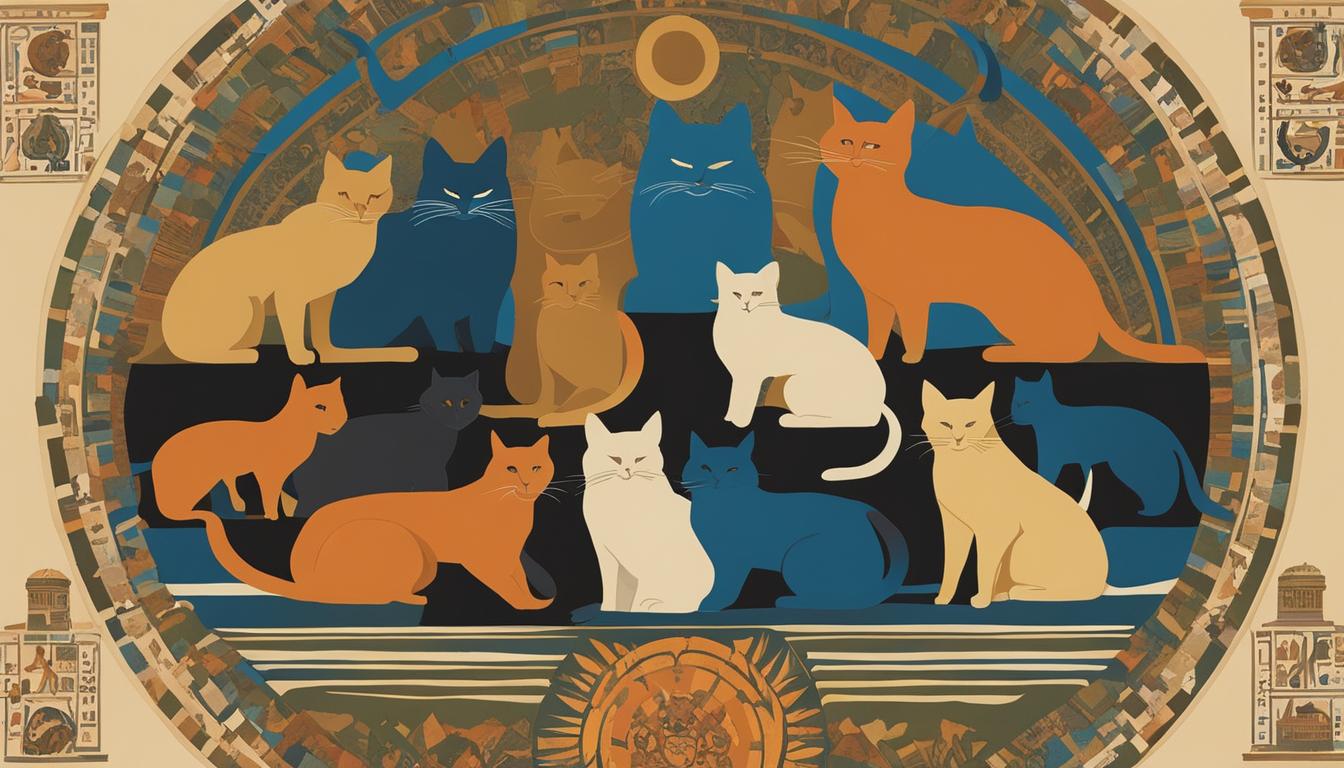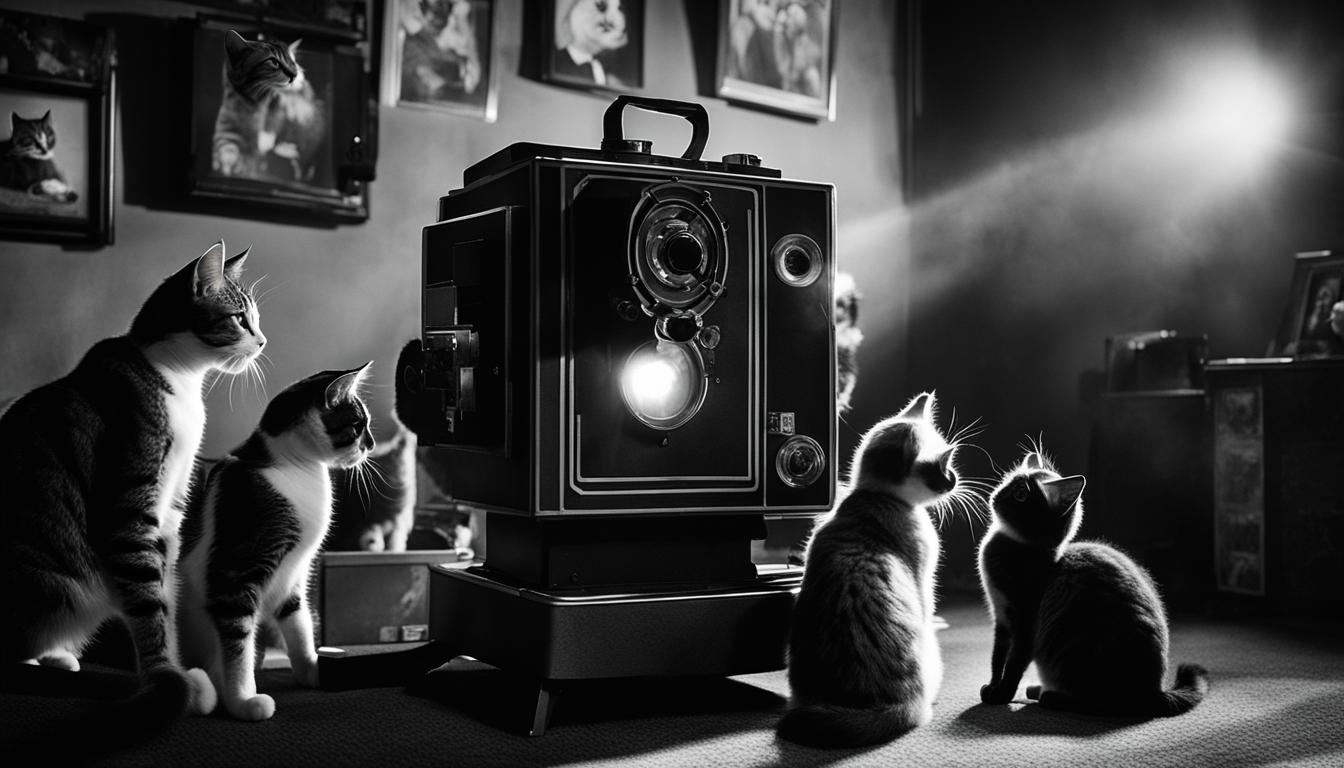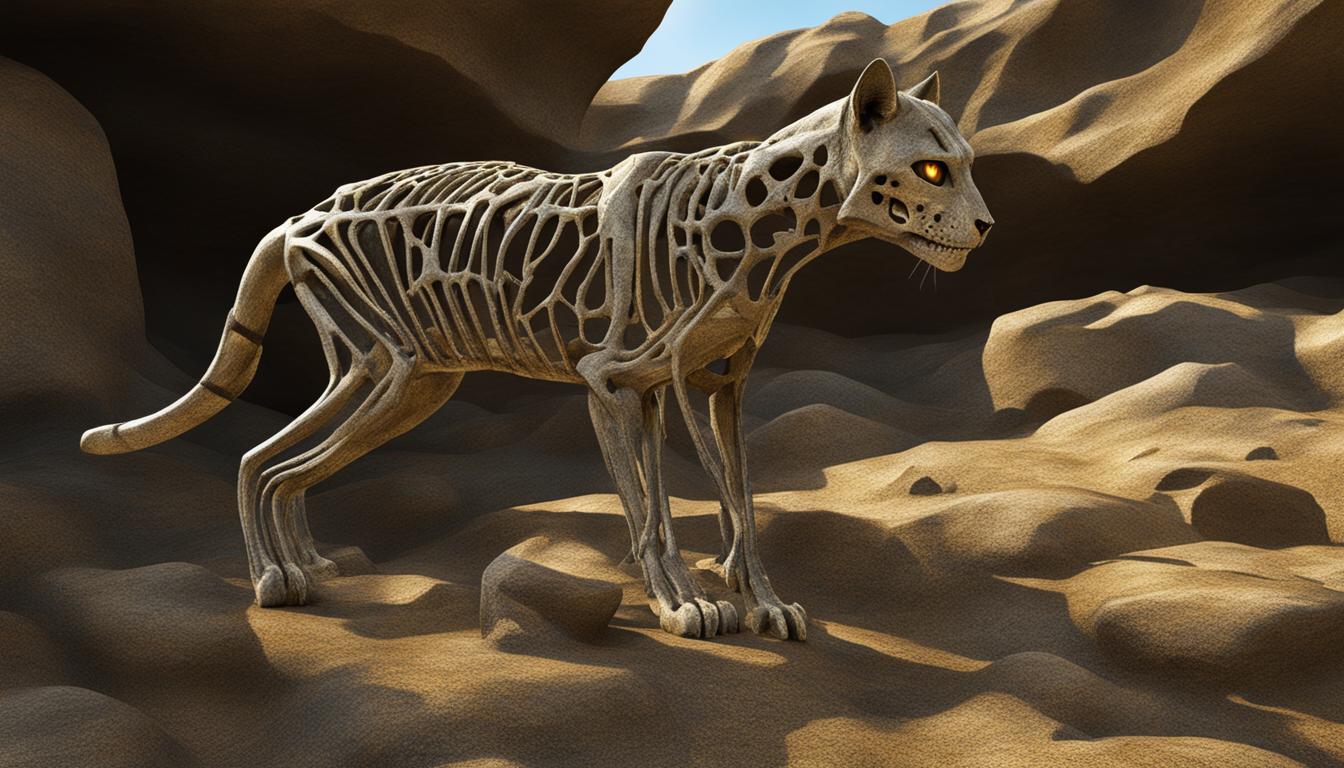Hello there, feline enthusiasts! Today, I invite you on a captivating journey through time as we explore the remarkable milestones in feline veterinary care. From ancient civilizations to modern breakthroughs, we’ll delve into the fascinating advancements that have transformed cat healthcare throughout history.
Imagine the ancient Egyptians worshipping their feline companions, unaware of the groundbreaking medical knowledge we possess today. Cats have been our loyal companions for centuries, and their well-being has always been of utmost importance. So, let’s embark on this quest to unravel the secrets of feline veterinary milestones and uncover the evolution of cat care.
Key Takeaways:
- Advancements in cat healthcare have greatly improved the well-being of our feline friends.
- The history of feline medicine spans across civilizations, with each era contributing to our understanding of cat care.
- From ancient Egypt to modern times, cat healthcare has evolved to meet the specific needs of different life stages.
- Understanding the milestones in kittenhood, maintenance years, and senior years is crucial for providing optimal care.
- Veterinary advancements play a significant role in improving the overall health and well-being of cats.
Kittenhood: The First Stage of a Cat’s Life
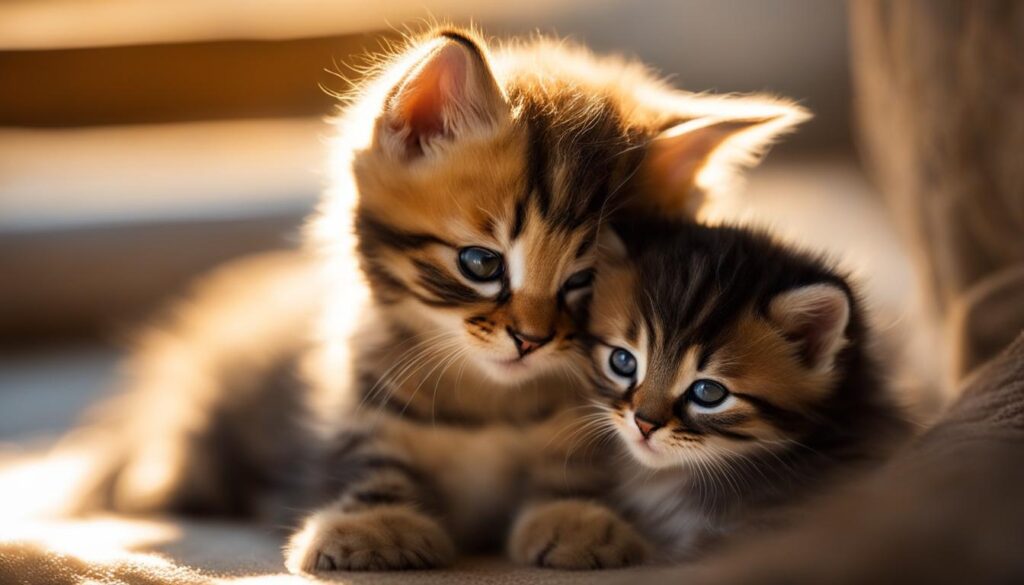
During the first year of a cat’s life, they go through a stage known as kittenhood. This is a crucial period of rapid growth and development, where kittens transition from being dependent on their mother to becoming independent individuals. It is essential to provide proper care and nutrition during this stage to ensure their healthy development.
Kitten food plays a vital role in supporting the growth and energy needs of young cats. It is formulated with higher levels of protein, fats, and essential nutrients to support their developing muscles, bones, and organs. Feeding them a balanced diet of kitten food will help them reach their full potential and lay the foundation for a healthy and active adult life.
In addition to their dietary needs, kittens require routine preventive veterinary care. Regular vaccinations and deworming are necessary to protect them from common diseases and parasites. Veterinary visits also provide an opportunity to monitor their growth, offer guidance on behavior training, and address any health concerns that may arise during this crucial stage.
Training and Socialization
Training and socialization are also essential components of kittenhood. Cats are highly adaptable and intelligent animals, and positive reinforcement training methods can help them learn desired behaviors and prevent future behavior problems. Additionally, early socialization with humans and other animals is crucial for developing their social skills and ensuring they grow up to be well-adjusted and confident cats.
| Key Aspects of Kittenhood | Guidelines |
|---|---|
| Diet | Feed a balanced diet of kitten food formulated for their specific nutritional needs. |
| Veterinary Care | Schedule regular preventive vet visits for vaccinations, deworming, and overall health monitoring. |
| Training | Use positive reinforcement methods to train desired behaviors and prevent future behavior problems. |
| Socialization | Expose kittens to various people, animals, and environments to help them develop good social skills. |
As Mark Twain once said, “If animals could speak, the dog would be a blundering outspoken fellow, but the cat would have the rare grace of never saying a word too much.”
In conclusion, the kittenhood stage is a crucial time in a cat’s life, where proper nutrition, preventive veterinary care, and training play significant roles. Providing kittens with the necessary care during this stage will set them up for a healthy and happy adulthood. By nurturing their growth and fostering positive behaviors, we can ensure that our feline friends thrive and bring joy to our lives for years to come.
Maintenance Years: Adult Cat Care
During the maintenance years, which typically span from one to ten years old, adult cats require specific care to ensure their overall health and well-being. This stage is crucial as cats have ceased rapid growth and their activity levels may start to decline. To provide the best care for your adult cat, there are several key areas to focus on.
Diet: Providing a High-Quality Diet
One of the most important aspects of adult cat care is their diet. Cats should be fed a high-quality diet specifically formulated for adult cats. This ensures they receive the necessary nutrients to support their overall health and energy levels. Consult with your veterinarian to determine the appropriate diet for your cat’s specific needs.
Play and Exercise: Keeping Them Active
Regular play and exercise are vital for adult cats to maintain their physical and mental well-being. Engage your cat in interactive play sessions that encourage their natural hunting instincts. This not only provides exercise but also helps prevent behavioral issues and stimulates their senses.
Veterinary Care: Routine Check-ups and Preventive Measures
Regular veterinary care is crucial during the maintenance years. Schedule routine check-ups to monitor your cat’s overall health and detect any potential issues early on. In addition to regular exams, ensure your cat is up to date on vaccinations, flea and tick prevention, and dental care. By taking these preventive measures, you can help keep your cat healthy and prevent future health problems.
| Aspect of Adult Cat Care | Recommendation |
|---|---|
| Diet | Provide a high-quality diet formulated for adult cats |
| Play and Exercise | Engage in regular interactive play sessions |
| Veterinary Care | Schedule routine check-ups and preventive measures |
By focusing on these aspects of adult cat care, you can help ensure that your cat thrives during their maintenance years. Providing a high-quality diet, engaging in regular play, and maintaining routine veterinary care are the pillars of keeping your adult cat healthy and happy. Remember, every cat is unique, so consult with your veterinarian to tailor their care plan to their individual needs.

Senior Years: Care for Aging Cats
As cats enter their senior years, it becomes crucial to provide them with specialized veterinary care to ensure their health and well-being. Age-related diseases can start to manifest during this stage, and regular check-ups are essential for early detection and intervention.
Schedule routine veterinary visits for your senior cat to monitor their overall health and screen for common age-related conditions such as kidney disease, arthritis, and hyperthyroidism. These conditions can be managed more effectively if detected early, improving your cat’s quality of life and potentially extending their lifespan.
In addition to regular check-ups, it’s important to pay attention to any changes in your cat’s behavior or appearance. Keep an eye out for signs of discomfort, loss of appetite, increased thirst, or difficulty with mobility. These could be indications of underlying health issues that require immediate veterinary attention.
| Common Age-Related Diseases in Senior Cats | Symptoms to Look Out For | Veterinary Management |
|---|---|---|
| Kidney Disease | Increased thirst, frequent urination, weight loss | Specialized diet, fluid therapy, medication |
| Arthritis | Limping, difficulty jumping, decreased activity | Pain management, joint supplements, physical therapy |
| Hyperthyroidism | Weight loss, increased appetite, restlessness | Medication, radioactive iodine therapy, surgery |
Providing a comfortable and enriching environment for your senior cat is also important. Ensure they have easy access to their litter box, food, and water bowls. Consider providing soft bedding and low-entry litter boxes to accommodate any mobility issues they may experience. Interactive toys and gentle play sessions can help keep their minds engaged and their bodies active.
Remember, senior cats require a little extra care and attention, but with the right veterinary care and environmental modifications, they can continue to enjoy a happy and fulfilling life well into their golden years.
“The love and care you provide for your senior cat can make a significant difference in their quality of life.” – Dr. Emily Johnson, Feline Veterinarian
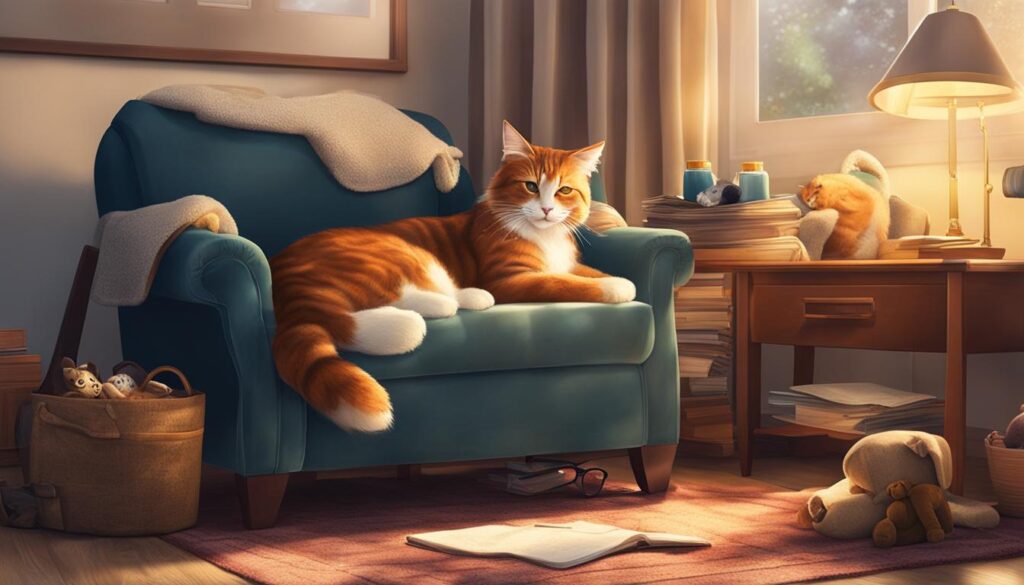
Cats’ Lifespan and Age Equivalents
As cat owners, we often wonder how long our feline friends will be with us. Cats have a relatively long lifespan compared to other small mammals, and understanding their aging process and age equivalents can help us better manage their care. The average lifespan of a pet cat is around 13 to 14 years, but well-cared-for cats can live beyond 15 years. In fact, some individual cats have been known to live as long as 18, 20, or even 25 to 30 years.
To better comprehend a cat’s age, it is helpful to know the age equivalents in relation to humans. The general rule of thumb is that one cat year is roughly equivalent to four human years. Therefore, a 10-year-old cat would be approximately 50 in human years. However, this conversion is not set in stone, and various factors such as breed, genetics, and overall health can influence a cat’s aging process.
It’s important to note that cats age differently than humans. While they may experience similar age-related changes, such as decreased mobility or changes in appetite, the progression of these changes may vary. Regular veterinary check-ups can help monitor a cat’s health and detect any age-related diseases at an early stage, ensuring prompt treatment and improved quality of life. Understanding the age equivalents and aging process allows us to provide the appropriate care and attention to our feline companions as they journey through their different life stages.
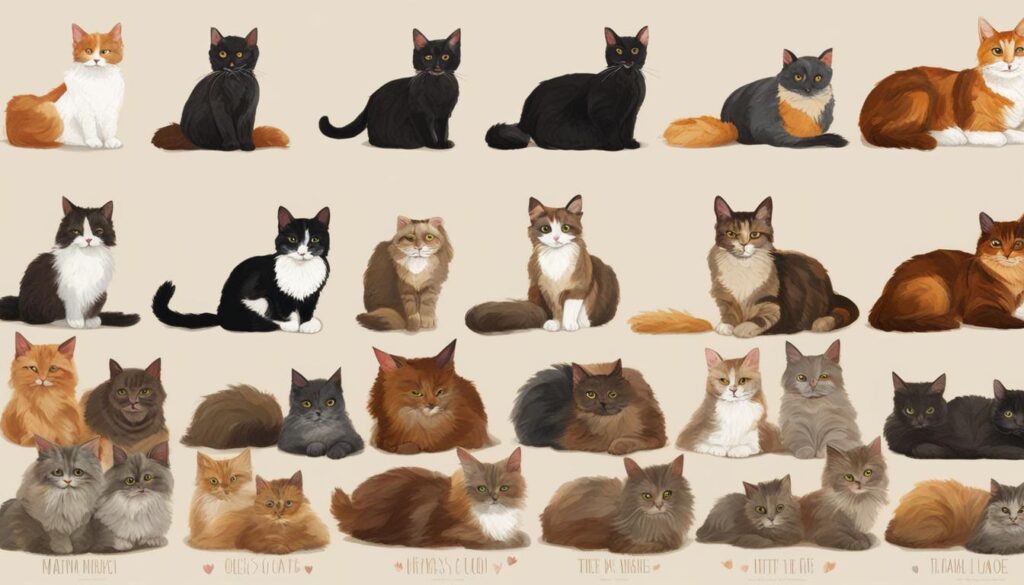
The Table below shows the age equivalents between cats and humans:
| Cat Age | Human Age Equivalent |
|---|---|
| 1 year | 4 years |
| 2 years | 8 years |
| 3 years | 12 years |
| 4 years | 16 years |
| 5 years | 20 years |
| 6 years | 24 years |
| 7 years | 28 years |
| 8 years | 32 years |
| 9 years | 36 years |
| 10 years | 40 years |
Conclusion
As I reflect on the fascinating journey of feline veterinary care, it’s clear how far we’ve come in understanding and meeting the unique needs of our beloved cats. From the adorable kittenhood stage to the graceful senior years, each milestone has paved the way for a healthier and happier feline experience.
Throughout history, numerous feline veterinary milestones have shaped the way we care for our furry friends. The progress made in kitten care, adult cat care, and senior cat care has been nothing short of remarkable. Our understanding of preventive measures, nutrition, and disease management has improved, thanks to the dedication and ingenuity of veterinary professionals worldwide.
Through these milestones, we have witnessed the power of tailored care for cats at every life stage. From ensuring proper nutrition and routine veterinary visits for kittens, to providing high-quality diets and regular play for adult cats, to the more vigilant monitoring and disease management for senior cats, we have truly elevated the standards of feline care.
Looking back at cat care history, it’s evident that our commitment to the well-being of our feline companions has never wavered. Cat owners can now rely on a wealth of knowledge and advancements in veterinary care to give their cats the best possible life. By understanding the specific needs of cats in each life stage, we can ensure that our furry friends thrive, bringing joy and companionship for years to come.
FAQ
What are the three main stages of aging in cats?
The three main stages of aging in cats are kittenhood, maintenance years, and senior years.
What are the nutritional needs of kittens?
Kittens require a diet of kitten food to support their rapid growth and development.
What kind of veterinary care do kittens need?
Kittens should receive routine preventive veterinary care to ensure their health and well-being.
What is important to consider during the maintenance years of a cat’s life?
During the maintenance years, adult cats require a high-quality diet formulated for adult cats and regular play to maintain their health and activity levels.
What should be monitored in senior cats?
Senior cats require increased veterinary care to detect early signs of age-related diseases and chronic disease management.
How long do cats typically live?
The average lifespan of a pet cat is around 13 to 14 years, but they can live beyond 15 years with proper care.
What advancements have been made in feline veterinary care?
Feline veterinary care has evolved over the years, with milestones in kitten care, adult cat care, and senior cat care.
How can cat owners ensure their feline companions lead healthy lives?
By providing the right nutrition, regular play, and routine veterinary care, cat owners can ensure their feline companions lead healthy and happy lives.

